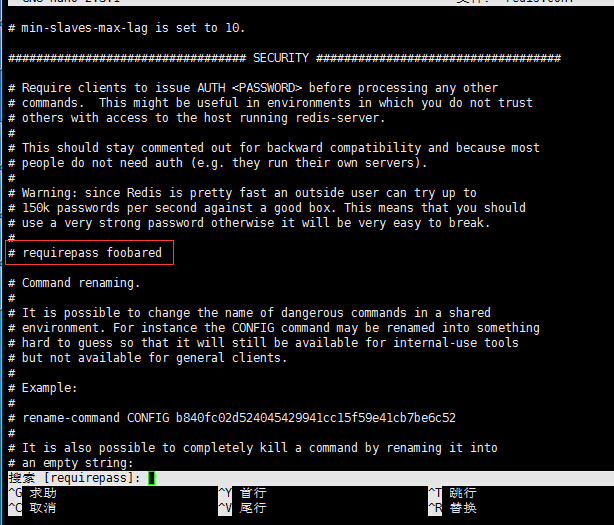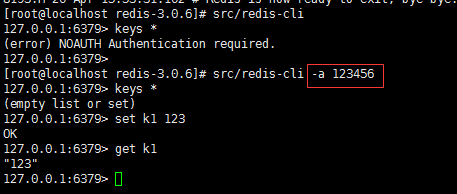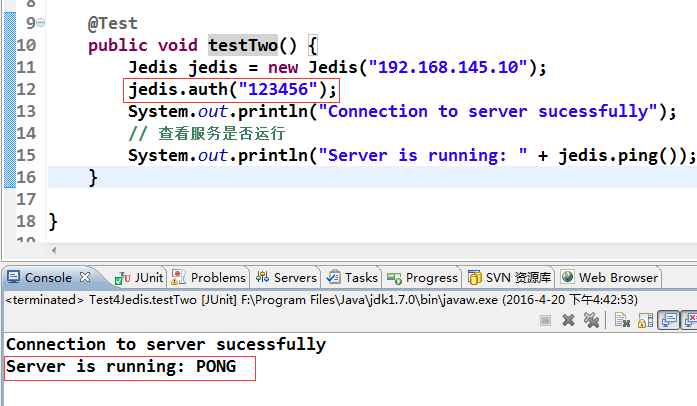Redis 设置密码登录
前言
redis在生产环境中通常都会设置密码以保证一定的安全性,本篇blog就简单记录一下如何在redis中设置客户端登录密码。
修改redis.conf
RT,打开redis.conf文件,搜索requirepass关键字,如下图: 
关注标记的那一行,#requirepass foobared。设置密码的方法就是去掉注释的#,把foobared替换成自己的密码即可,例如将密码设置为123456: 
修改完成后重启redis,再次通过redis客户端redis-cli登录并操作可以发现会报一个身份认证错误: 
这就说明我们已经成功的设置了密码,所以通过客户端连接的话必须加上密码参数才能正常连接: 
如上图所示,加了-a参数之后即可正常连接并操作redis。
jedis设置密码
当我们用Java客户端连接redis时会遇到同样的问题,下面看一段简单的jedis连接redis的测试代码:
package com.firstelite.test;
import org.junit.Test;
import redis.clients.jedis.Jedis;
public class Test4Jedis {
@Test
public void testTwo() {
Jedis jedis = new Jedis("192.168.145.10");
System.out.println("Connection to server sucessfully");
// 查看服务是否运行
System.out.println("Server is running: " + jedis.ping());
}
}非常简单,仅仅是测试一下Jedis是否连通redis服务器,运行junit后我们发现报异常了:
redis.clients.jedis.exceptions.JedisDataException: NOAUTH Authentication required.
at redis.clients.jedis.Protocol.processError(Protocol.java:117)
at redis.clients.jedis.Protocol.process(Protocol.java:142)
at redis.clients.jedis.Protocol.read(Protocol.java:196)
at redis.clients.jedis.Connection.readProtocolWithCheckingBroken(Connection.java:288)
at redis.clients.jedis.Connection.getStatusCodeReply(Connection.java:187)
at redis.clients.jedis.BinaryJedis.ping(BinaryJedis.java:109)
at com.firstelite.test.Test4Jedis.testTwo(Test4Jedis.java:15)
at sun.reflect.NativeMethodAccessorImpl.invoke0(Native Method)
at sun.reflect.NativeMethodAccessorImpl.invoke(NativeMethodAccessorImpl.java:57)
at sun.reflect.DelegatingMethodAccessorImpl.invoke(DelegatingMethodAccessorImpl.java:43)
at java.lang.reflect.Method.invoke(Method.java:601)
at org.junit.runners.model.FrameworkMethod$1.runReflectiveCall(FrameworkMethod.java:44)
at org.junit.internal.runners.model.ReflectiveCallable.run(ReflectiveCallable.java:15)
at org.junit.runners.model.FrameworkMethod.invokeExplosively(FrameworkMethod.java:41)
at org.junit.internal.runners.statements.InvokeMethod.evaluate(InvokeMethod.java:20)
at org.junit.runners.BlockJUnit4ClassRunner.runNotIgnored(BlockJUnit4ClassRunner.java:79)
at org.junit.runners.BlockJUnit4ClassRunner.runChild(BlockJUnit4ClassRunner.java:71)
at org.junit.runners.BlockJUnit4ClassRunner.runChild(BlockJUnit4ClassRunner.java:49)
at org.junit.runners.ParentRunner$3.run(ParentRunner.java:193)
at org.junit.runners.ParentRunner$1.schedule(ParentRunner.java:52)
at org.junit.runners.ParentRunner.runChildren(ParentRunner.java:191)
at org.junit.runners.ParentRunner.access$000(ParentRunner.java:42)
at org.junit.runners.ParentRunner$2.evaluate(ParentRunner.java:184)
at org.junit.runners.ParentRunner.run(ParentRunner.java:236)
at org.eclipse.jdt.internal.junit4.runner.JUnit4TestReference.run(JUnit4TestReference.java:50)
at org.eclipse.jdt.internal.junit.runner.TestExecution.run(TestExecution.java:38)
at org.eclipse.jdt.internal.junit.runner.RemoteTestRunner.runTests(RemoteTestRunner.java:467)
at org.eclipse.jdt.internal.junit.runner.RemoteTestRunner.runTests(RemoteTestRunner.java:683)
at org.eclipse.jdt.internal.junit.runner.RemoteTestRunner.run(RemoteTestRunner.java:390)
at org.eclipse.jdt.internal.junit.runner.RemoteTestRunner.main(RemoteTestRunner.java:197)显而易见,由于我们设置了密码但在这里又没有指定密码,所以报了和刚才相同的错误,那么如何指定密码呢?很简单,Jedis的父类BinaryJedis提供了这样一样方法:
public String auth(final String password) {
checkIsInMulti();
client.auth(password);
return client.getStatusCodeReply();
}所以在创建了Jedis的实例后再加上一行jedis.auth("123456"); 即可,最后看一下运行结果: 
spring-data-redis设置密码
通常情况下在实际的java项目中我们会选择Spring提供的spring-data-redis来操作redis,spring的封装可以给我们提供很多便捷之处。那么spring-data-redis又是如何设置密码的呢?首先定义一个redis.properties配置文件,定义一组redis属性供spring加载使用,其中就包含密码(redis.password):
# Redis settings
redis.host=192.168.145.10
redis.port=6379
redis.password=123456
redis.timeout=100000
redis.maxTotal=300
redis.maxIdle=100
redis.maxWaitMillis=1000
redis.testOnBorrow=true 然后在由Spring封装的JedisConnectionFactory中来设置密码属性即可,下面是完整redis配置:
文章来源于互联网:Redis 设置密码登录




文章评论